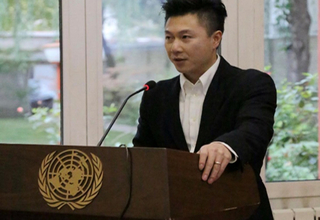The United Nations has set Investing in Young People as the theme of the World Population Day in 2014. The commemorations around the world are sending out a clear and strong message: young people must be at the center stage of the post-2015 global development agenda and investing in young people matters for now and for the future.
In his Statement for World Population Day, Dr. Babatunde Osotimehin, United Nations Under-Secretary-General and the Executive Director of UNFPA, the United Nations Population Fund, reinforced UNFPA’s full support to all efforts to promote young people’s aspirations and to place young people at the very heart of national and global development efforts.
Today’s adolescents and youth are 1.8 billion strong and form a quarter of the world’s population. They are shaping social and economic development, challenging social norms and values, and building the foundation of the world’s future.
Governments and the international community are increasingly conscious of the importance of providing resources and opportunities for all young people to reach their full potential as individuals and citizens. They recognize that investing in young people and enabling them to exercise their human rights not only benefits young people themselves, but can also help their countries reap the dividend.
We know that healthy, educated, productive and fully engaged young people can help break the cycle of intergenerational poverty and are more resilient in the face of individual and societal challenges. As skilled and informed citizens, they can contribute more fully to their communities and nations.
While notable progress has been made, many young people—especially adolescent girls—are denied the investments and opportunities that they require to realize their full potential. For millions of young people around the world, puberty---the biological onset of adolescence---brings not lonely changes to their bodies but also new vulnerabilities to human rights abuses, particularly in the areas of sexuality, marriage and child bearing.
This is why young people, especially adolescent girls, are at the heart of our work at UNFPA, the United Nations Population Fund. Working with a multitude of partners, in particular young people themselves, UNFPA is advocating policies and programmes that invest in adolescents and youth and foster a positive environment for them; promoting their access to comprehensive sexuality education as well as quality sexual and reproductive health services, including family planning; and facilitating their leadership and participation. We are doing this with an emphasis on reaching the poorest, most marginalized and underserved adolescent girls.
Similar to other countries, in China, fast economic development and industrialization, accompanied by massive urbanization and increasing influence of globalization, has resulted in profound social transformation. In this situation young people face the pressure of meeting ever increasing expectations from various parts of society. As society transforms, young people need to adapt and be responsive to the multiple threats that they encounter in the process of growing up. That means they need to develop life-skills that will enable them to make informed and responsible choices. This includes gender sensitive comprehensive sexuality education, proper access to information and youth friendly services and acquiring the knowledge and ability not to engage in harmful practices and substance abuse.
One of those worrying threats facing young people in China concerns the exposure to sexual and reproductive health risks. Practicing unsafe sex, leads to unplanned pregnancies, abortions and sexually transmitted infections including HIV. A UNFPA-supported national survey on access and utilization of sexual and reproductive health services by unmarried youth aged 15-24 in China showed that even though the majority of unmarried youth are open to having sex before marriage, only a very small portion of them—less than 5 per cent, are well informed about reproductive health. Less than 15 per cent had correct knowledge about preventing HIV infection. The survey showed 4 out of 100 unmarried girls aged 15-24 became pregnant, and 90 per cent of these pregnancies resulted in abortion.
UNFPA has been working with government partners, academia, civil society, youth groups and media in China to promote comprehensive sexuality education, youth-friendly sexual and reproductive health services through leading research, advocacy and policy dialogue, as well as through campaigning and youth-led innovative activities. We have seen progress made in the collaborative efforts, and clear commitments from all parties involved to invest much more to fulfil every young person’s potential.
Adolescents and young people are central to sustainable development. It is essential to protect their rights and invest in their future. We must ensure young people have access to employment, life skills, education, and health. This must include sexual and reproductive health services and comprehensive sexuality education.
Adolescents and young people are at the center of the solution. In order to support effective policy-making and improvement of information and service provision to respond to the emerging challenges, we must partner with young people themselves. Participation is a right of young people in matters concerning them. It is also a means to achieve youth-related goals. When identifying the needs of young people and how to close the gaps between the needs and the reality, young people must be consulted and involved. Policy makers and service providers must form partnerships with young people and work hand-in-hand in closing the existing gaps.
Underlying all of these efforts is the notion that the dignity and human rights of young people, especially adolescent girls, must be respected, protected and fulfilled.
Let us act now and let us act together in China and around the world---investing in young people, for now and for a better future.
Arie Hoekman
UNFPA Representative to China



